In May this year, when our rapeseed fields were looking their best in full bloom, Nadiya Hussain and a filming crew from Hungry Gap Productions came to Bottom Farm to learn more about how we produce our cold pressed rapeseed oil. The reason for the visit was to film a segment for Nadiya’s new series, Nadiya’s Family Favourites!
Starting in the fields, Duncan explained how he grows the rapeseed to LEAF (Linking Environment and Farming) Marque standards and how the plant grows. He then showed Nadiya the cold pressing method we use and how we bottle our oil.
As Nadiya is obviously a brilliant baker and chef (she won the Great British Bake Off in 2015) she was keen to learn more about cooking with Mellow Yellow Cold Pressed Rapeseed Oil! So she headed off to The Mermaid in Ellington and head chef, Nick Marriot put her taste buds to the test with a roast potato challenge. After cooking roast potatoes in either cold pressed rapeseed oil, sunflower oil or olive oil, Nick challenged Nadiya to identify each oil. With it’s high smoke point giving super crispy roasties and subtle nutty flavour, she easily spotted the ones cooked in Mellow Yellow!
We absolutely loved having Nadiya visit us at Bottom Farm, it was a fantastic day and watching ourselves on TV is incredibly exciting! If you didn’t catch the episode live last week, you can catch up on BBC iPlayer now: https://www.bbc.co.uk/iplayer/episode/b0bc26qk/nadiyas-family-favourites-series-1-1-family-days-out
Nadiya’s Family Favourites is on BBC2 every Monday at 8pm.
I have been asked in the past what we do in the winter months. People comment, saying “Surely as an arable farmer, you plant the crops in the autumn, go away on holiday and come back the following summer ready to harvest them?” Nice thought, but I’m afraid the reality is a little different.
Admittedly, on an arable farm, where we only grow crops and do not have any livestock to look after, the winter months are quiet and it can be an opportunity to relax on a holiday if you wish. However, I have always found it the time of year for research, planning and projects, of which we have done many over the years. Back around the millennium, I remember spending many winter months researching the viability of creating a cold pressed rapeseed oil business on our farm, as a diversification project on something I found very interesting and to hopefully bring a little extra income to the family business. Looking back, I think this was time very well spent.
Of course winter is an ideal time for us to service all the farm machinery in preparation for the coming spring and summer months when we will want it to work long and hard without too many breakdowns. We have done many building projects over the years, both for new machinery ideas and for buildings on the farm. Some examples have been building a new trailer, or creating a water bowser. In the past, when I was a young boy and even before I was born, my Father and Grandfather were at their happiest creating new weird and wonderful machines in the farm workshop. Two of the most extravagant examples included a six-wheel drive tractor, converted from a World War II army fire engine. I remember going across the fields with them on this machine, before it finally over heated and was retired in the nettles. Their most famous project was when they took two normal tractors, replaced the standard engines with more powerful versions, before removing the front axils off both tractors and joining them together to make an articulated four-wheel drive machine, driven by one person from the back tractor. This was certainly cutting-edge engineering in its day, that was later copied and refined by machinery manufacturers in future years.
We have restored our beautiful traditional barns and converted them from redundant old farm buildings into offices, including our farm office today. New modern grain stores have been designed and built to cope with storing and drying the grain at the speed the modern combine harvester brings the crops in. Over the years, we have built all of the factory and some of the machinery inside it for Farrington Oils. Some of these projects seem to start as winter job ideas, but tend to stretch through other months of the year and before long take on a whole life of their own. The most recent being the latest expansion of Farrington Oils to create a new toilet and changing facilities, as well as extra space to mix our salad dressings and store ingredients. We have even made a little development kitchen in which Eli is currently very busy with her trusted jam jar creating some possible exciting new dressing recipes. This whole project started in April last year, we had a few weeks break for harvest to take place, before finally finishing the project just before Christmas.
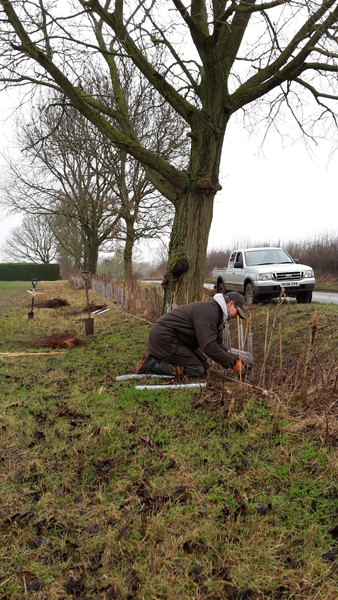
Marvin planting saplings in Jan 2018
The other main type of project we have done during winter over the years is planting trees and hedges. We have literally planted thousands of trees and several kilometres of hedges since 1987 when my Father planted the first couple of spinneys on the farm. They are now well established, adding beauty and wildlife habitats to the landscape. This year we have been at it again. Marvin spent the time before Christmas with the chainsaw, thinning out dead wood from a copse area and old hedge, in readiness to replant with new young saplings in the first weeks of January. He has now created a few hundred more metres of hedgerow – Father and I have helped him with the spade to get some of the 2,000 hedge and tree plants put into the soil. We will have to weed around the young saplings for the first two years, after that they will hopefully grow and thrive, adding more beauty and wildlife habitat for many years to come. Additionally, we have a pile of wood ready to cut up for the fire to keep us warm at home next year.
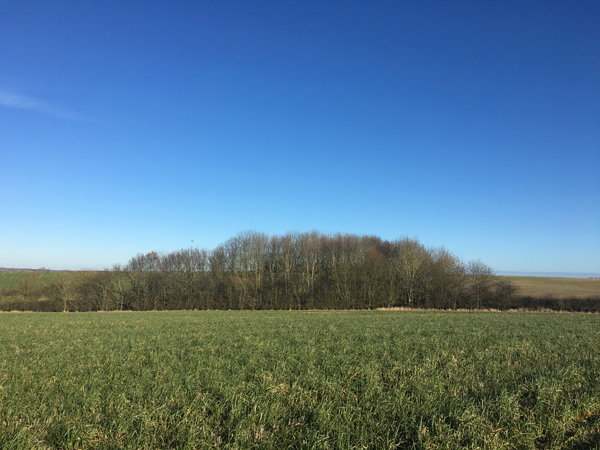
Spinney on Bottom Farm that was planted in 1987, photo taken Feb 2018.
Although winter on Bottom Farm may not be spent on a combine harvester or tractor, it certainly is far from quiet!
Not only available in shops, we also sell our oil to various pubs, restaurants and cafes across the UK for use in their kitchens. Many of these businesses use our oil in interesting and innovative ways, and The Mermaid at Ellington is no exception!
The Mermaid can be found in the idyllic Cambridgeshire village of Ellington in a beautiful 14th Century public house. The name comes from the old ships timber used in its construction many years ago. The owner and head chef, Nick Marriott, is a Michelin star-trained chef who is passionate about bringing vibrant and refreshingly new ideas to a characteristic and historic country pub.
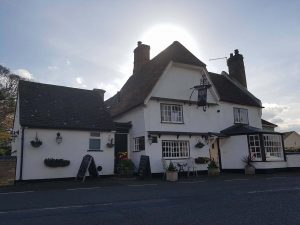
Having used our oil for a while, Nick recently contacted us with an idea. He wanted to use our rapeseed before it was pressed, and instead, germinate the seeds for an exciting new dish.
Here’s what Nick had to say about this innovative new way of using rapeseed:
“Here at The Mermaid at Ellington, Mellow Yellow Rapeseed Oil has fast become our go to quality oil of choice. With it being high in mono-unsaturated fat, it ensures us cooking at high temperatures without corrupting its lovely nutty character & flavour.
We now also use rapeseeds to bring to life our ‘Snail Garden.’ We germinate the rapeseeds and grow them into small sprouts by soaking the seeds and keeping them in a warm area to do their work. This process usually takes around 5 days but is definitely worth the wait. The germinated rapeseed add a beautiful image and perfect texture of a real life soil, as well as adding an earthy flavour to the dish. Combining the rapeseed with puffed wild rice & quinoa, caramelised chicory & sesame, the ideal soil is created for the garden. Hidden underneath sits a smoked garlic yoghurt and finished with salsify bark, baby vegetables and rosemary branches with flowers from the Mermaid garden.
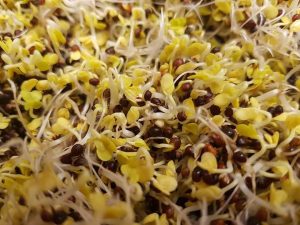
Mellow Yellow Rapeseed Oil is also a perfect option for dressings and creating flavoured oil in which we make a lemon grass & ginger oil for all our Asian style cooking. We very much recommend this high quality product.”
Thanks Nick!
For more information on The Mermaid at Ellington, head over to their website: http://www.themermaidellington.co.uk
Here at Farrington’s, we don’t use neonicotinoids on our rapeseed crop. This is for many reasons, mainly because of the concerns related to this pesticide and the effect on bees. You can read more about our bee friendly rapeseed and what else we do to keep the bees on our farm healthy and happy here.
Friends of the Earth, a campaign group looking for solutions to environmental problems, is concerned about the impact of neonicotinoids on bees and other pollinators and urged farmers to join them in pledging not to use neonicotinoids. We were asked us to join the Bee Friendly Shoppers Guide to Rapeseed Oil, of which we are 1 of only 7 rapeseed oil producers on this list. Of course we said yes! The guide aims to educate shoppers on which oils to buy, and how these oils are helping Britain’s bees. As part of the guide, we have pledged not to use the three neonicotinoid pesticides which are currently restricted across the EU, and will continue to avoid these pesticide even if the ban is lifted.
The Bee Friendly Shoppers Guide to Rapeseed Oil is supported by a number of leading chefs. These include Kevin Gratton, chef director for Mark Hix Restaurants, David Everitt-Matthias of Le Champignon Sauvage, Martin Burge, executive chef at Whatley Manor Hotel & Spa and Tom Hunt, eco chef owner of Poco Tapas Bar. Friends of the Earth, alongside the supporting farmers and chefs, are asking consumers to support the initiative by buying the bee-friendly rapeseed oils detailed in the guide.
Friends of the Earth’s Bee Campaigner, Nick Rau, said “We’re delighted Farrington’s Mellow Yellow is standing up for Britain’s bees by pledging not to use these three bee-harming pesticides on their rapeseed crops. They deserve our support. We hope more farmers and producers follow their lead and say no to these neonicotinoid pesticides. Nature-loving shoppers can back this pioneering initiative by checking out the Bee Friendly Shoppers Guide to Rapeseed Oil and choosing these products in supermarkets, local stores and online.”
To read more about the Bee Friendly Shoppers Guide to Rapeseed Oil, please visit: http://www.rapeseedoilguide.com/
Back in 2012, thanks to the growing success of Farrington’s Mellow Yellow we started using rapeseed from a second farm, working with our neighbours, in addition to the seed we grow on our own farm. See my blog; “Mellow Yellow Popularity Grows” April 10, 2012. Now, we have added a third farmer to the list.
The Bletsoe and Farrington families have been neighbouring farmers since at least my great grandfather’s day. Like most farming neighbours, we have developed strong friendships over those generations, built on trust and the odd bit of occasional light hearted banter.
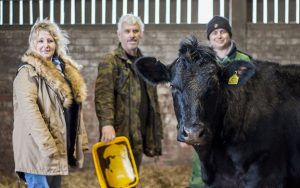
Emma Bletsoe has, for several years, used our rapemeal, produced as the by-product from pressing the oil out of the seed, to feed her cattle. Then a couple of years ago, Emma and I were chatting at a local gathering, when the conversation moved on to her rapeseed crop and my future needs for more LEAF Marque rapeseed. Emma thought that as well as buying the meal off us, perhaps she could also sell us her seed in the first place. Emma and her guys on the farm, Garry and Stuart, have worked hard to meet the rigorous LEAF Marque standards, which they passed with flying colours.
Now we purchase seed from Emma, which ensures I have a fully traceable, accredited supplier; while Emma gets a little bonus and the odd bottle of oil for the extra work required. Then once we have pressed the seed to produce our Mellow Yellow, Gary or Sturt arrive with their tractor and trailer to collect the rapemeal, which they use to make a healthy and, again fully traceable, meal for their cattle. This is something the cows particularly like in the cold winter months when they are kept in warm straw-bedded barns, as opposed to eating fresh grass in the fields during the summer.
This is a prime example of neighbouring farmers working well together, making happy farmers, happy cows and most importantly, the best quality, delicious Farrington’s Mellow Yellow that you can trust every time.
A while ago we were very excited that an old silver looking ring was unearthed on our farm. Although it showed the signs of having laid in the soil for several years, with damage from years of cultivation and general farming activities, it was decided to have it looked at by the experts. After several months, The British Museum has confirmed that our little battered silver ring is, in fact, a Roman ring, around 1,800 years old! We are obviously so thrilled to learn this and my mind starts wondering about the history and stories it may come with.
Just think, how was this ring dropped or lost all those years ago? Who lost it? Was the field it was found in, a field back in 200AD and if so what crops were growing at the time? I learned years ago from my research into Farrington’s Mellow Yellow, that it was the Romans who initially bought rapeseed to Britain. Would I be stretching it a bit far to think that maybe the owner of this ring once also grew rapeseed in the same field?
The ring has been declared treasure and will be on display for everyone to see at the Norris Museum in St Ives, Cambridgeshire from the summer of 2017. I can’t wait to see it in its new home.
Neonicotinoids insecticides hit the headlines because their use for controlling cabbage stem flea beetle in crops of rapeseed and the suspected links to declining numbers of honeybees and native bumble bees. At Farrington’s we have more questions from our valued customers about this, than any other topic. Before I go any further, just to confirm we are growing bee friendly rapeseed, we do not use Neonicotinoids in growing our rapeseed and do not intend to if the ban is lifted.
How we grow our crops and look after the wider environment has always been my top priority at Bottom Farm. Indeed, I joined LEAF (Linking Environment and Farming) back in 1997 to learn more about doing the right thing in this area.
Why is Cabbage Stem Flea Beetle such a problem?
Rapeseed plants grow from the tiny little black seeds planted at the end of August each year. The first few weeks are vital in the survival of the crop, which requires a warm, moist soil to help it germinate and tentatively put its head above the surface, from which the tender young plants start to grow. However, these young tender plants are delicious to a number of predators including flea beetles. So much so that if the conditions are right for flea beetles, they can completely wipe out a crop overnight. After which it is often too late to replant a second crop of rapeseed, as the soil temperature has dropped below the minimum required for the plant to grow.
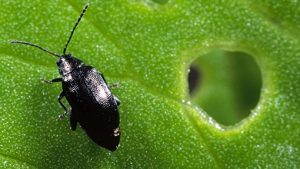
What is a Neonicotinoid?
Neonicotinoids are a group of insecticides based on nicotine. In rapeseed, the chemical is coated in tiny amounts onto the seed to be planted and moves (is translocated) into the growing plant as it emerges from the soil. When a flea beetle nibbles on said plant, there is just enough of the toxic chemical to kill the pest. But otherwise, it is a specifically targeted use of an insecticide in an ingenious way.
Concerns grew that numbers of both honey bees and bumble bees were declining, so scientists explored the potential causes. It appears there are several possible causes including; loss of habitat for bees to feed on and live in; potential pests and diseases affecting bees, such as Varroa mite; changing weather patterns, such as cool damp springs; use of agricultural pesticides.
Some research suggested that small amounts of Neonicotinoid translocated through to the pollen and nectar in the flowering rapeseed plants. When bees visited these flowers they were inadvertently ingesting the chemical which was causing them to lose their bearings; a bit like us trying to find our way home after having too much of a good night in the pub. Other research suggested longer term damage to the fertility of the bee colony.
Although research appeared inconclusive with the debate on both sides being passionate, the EU restricted the use of Neonicotinoids on rapeseed crops from 2013, until such time that more conclusive evidence is shown.
Growing Bee Friendly Rapeseed.
I use several approaches to try and grow a successful crop of rapeseed whilst looking after our bee populations.
– I use a crop rotation and have extended the rapeseed from one in 3 years, to one in 4 to 5 years. This will provide a bigger gap between the crop so as there is less food around for the flea beetle to live off, that will hopefully in time reduce the risk of attack.
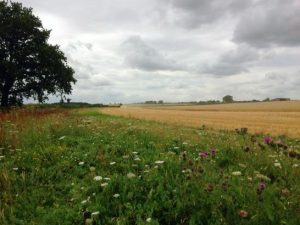
– Established wildflower meadow areas around the farm to create a perfect habitat with a variety of pollinating plants for bees and other beneficial insects to live off.
– Planting the crop into fertile soil, with the use of a healthy crop rotation which includes nutrient building cover crops to give the rapeseed the best possible chance to grow quickly out of the danger period when it is susceptible to flea beetle damage. This is backed up with a small amount of fertiliser if required.
– A local beekeeper has hives on the farm. The bees help fertilise our rapeseed and other crops, making delicious honey in the process.
– I am experimenting by growing companion crops of vetch and clover within the rapeseed. These create a friable soil structure and add nutrition to help the rapeseed plant grow well. It may also confuse a passing flea beetle as to what crop is actually growing in the field and may pass by unaware that their favourite meal is below them.
– As a final resort, we use an insecticide as found in head lice shampoo to kill bad infestations of flea beetle. If we use this, we make sure we spray the crop early in the morning or late at night, as the flea beetle will still be feeding on the crop, but the bees are all tucked up in bed.
In Summary, this hopefully explains some of the conundrums I have as a farmer in trying to do the best thing. Hopefully also, as I write in December 2016, with a temperature of -4.5°C this morning, I am confident that nature will help us enormously in reducing the number of flea beetles surviving the winter.
After nearly ten years, my monthly ramblings of life as a farmer, initially for a local village magazine and latterly for the Evening Telegraph; must come to an end as I need to spend more time helping our growing business.
Ten years ago, the economics of agriculture were not that inspiring and I was just starting out in a diversification project as Britain’s first person to grow, press and bottle rapeseed oil. In my mind this was going to be a small project to help supplement income from the farm, enabling Eli and me and, our young family to remain living and working on the farm. Little did I realise, that Farrington’s Mellow Yellow would become the success it has.
Within four years, Farrington Oils outgrew the farm in turnover. I had to start employing people and with it, learn very quickly how to find the right team to work with, as well as how to work with our increasing number of customers and meeting the many loyal consumers who buy our products that keep us all in business. I am very proud of the fact that in our little village of Hargrave, we now employ over 15 people. We have a fantastic team who are just as passionate about what we do here as I am.
There are many UK farmers now replicating what I started, of which there are three main brands, with us in the top two. However, while the success has been obvious, it is not the time to slow down resting on our laurels’. Competition is fierce keeping us all on our toes. As the market for cold pressed rapeseed oil matures, it is more important than ever to keep pushing forward, because if I don’t, others will and they could take our market. We are now looking for new customers both in the UK and abroad. I am delighted we are now; ‘exporting oil to the Arabs’ – its only small at the moment, but will hopefully grow, especially when Eli and I attend an international trade show in Dubai next February for example.
Closer to home as we need to travel the country visiting customers here, I have just invested in our first company car. To keep in line with our cool British credentials, it had to be a Mellow Yellow Mini from the local Mini dealer in Northampton and I love it. Mini is a successful British brand exporting 80% of what it produces, whilst this may be a tall order for Mellow Yellow, it is certainly something to aim for over the next few years. Look out for our soon to be branded Mellow Yellow Mini on the roads.
Thank-you to all of you who have read my diary over the last ten years, I can’t believe you could have put up with me complaining about the wrong type of weather on so many occasions. I have thoroughly enjoyed writing my diary and meeting so many readers over the years. I wish you all a very Merry Christmas and all the best for 2016.
Harvest finished in the second week of September, it was a rather drawn out event in the end, but on the whole went well. The new combine was the highlight of the year, a great machine that will hopefully be serving us well for the next decade. However, being a farmer, there is always something to worry about and this year it is the prices. The collapse in milk prices over the last year has been well published; but now it is hitting home with me of the 30% reduction in grain prices also, with no immediate prospect of a recovery on the horizon.
To take my mind off impending gloom on the current viability of British agriculture, I was delighted that our work in Farrington Oils has come to the attention of some influential people, like His Royal Highness.
A couple of weeks ago, I had a mysterious phone call to say we had been selected for a royal visit, to the home of Farrington’s Mellow Yellow “if you are interested?” Of course, we were interested, but the catch was it all had to be arranged within a few days. The timing was perfect for us as we have been investing in the business, hence we had something to talk about and see.
We hastily invited local councillors, colleagues, and customers to the event, with everyone being asked to keep it quiet. The drivers and armed police came out to check everything were up to scratch, with no security issues. Floors were scrubbed, equipment polished, whilst my mother and Eli made some Mellow Yellow inspired cakes and made sure we had enough cups and saucers to hand.
It also allowed us to exert some pressure on the local engineers to finish off the work in time for the occasion, it being finally finished the evening beforehand. We have installed more oil presses, increasing our capacity by two-thirds, along with two impressive oil storage tanks, increasing capacity by 400%. On the morning we busily gave the new equipment a final check-over before starting it working, nervously checking for leaks and issues, before getting changed into suit and tie.
His Royal Highness the Duke of Gloucester came to visit, spending time touring our factory and meeting the team. He bottled his own oil, before enjoying refreshments, chatting to our guests. It was a great event, I was very proud to show off our team at Farrington Oils. I was delighted to talk about our investment in equipment, a new staff position to look after national sales and our two latest export customers in the Middle East and Asia.
Following the visit, everyone was really pleased with a job well done, although exhausted. It is fantastic for company moral to be able to do something different and exciting occasionally; to invite customers and other guests to show them first hand what we do and, to be proud of our village and our county.
Day 32 in this year’s harvest and exhaustion has taken over from adrenalin. After an initial rain interrupted false start, the rape harvest went without a hitch, which despite the lack of rain in the months before, produced a pleasing ‘good average’ result. Following the rapeseed, we moved straight into to some early wheat on light land that had died a premature death from lack of moisture. This also flew by in record time, although the low yield had something to do with the speed we moved across the acres. Everything went to plan, no machinery breakdowns, long dry days and plenty of packed lunches and supplies to keep us going for two weeks without a stop, clocking up more hours than I like to think about.
Following the early wheat, we then had to be patient and wait for the next bit to mature. The weather was still perfect for combining, many neighbours were at it, but we had to wait a few more days. This is frustrating, as with experience the weather will change at any time. In theory, we only had another two weeks of combining and it would all be done for another year.
Finally, the wheat was just about ready, we combined one field with a very pleasing yield on our heavy land that I would not have expected only a month earlier. Then the rain arrived. The weather reports say the Jet Stream has gone south and our island nation is stuck between a high and a low-pressure system battling it out; the result being a prolonged period of sunshine and showers. All pretty standard, but frustrating never the less. We have now finished all of our winter wheat, combining as soon as the conditions allow, in a stop-start fashion resulting in us harvesting the same hours in a week as we were doing in a day at the start of harvest.
When conditions are like this, it is difficult to keep the adrenalin and motivation going, having to ensure we are absolutely ready in the right place when conditions are right. Late one Saturday night we needed to move the combine 300 metres from one field to another when a tyre blew on a trailer. Quickly Marvin and I got the compressor and tools to try to repair the tyre, but could soon see it was not going to happen. Rain was due the next day and we wanted to keep going. Time for blocks of wood and the forklift, and we were able to drag the trailer to the next field so the work could continue a bit longer.
We still have another few days worth of harvest to do, but I don’t know when we will get these days as August now turns into September. Father, Marvin and I have worked hard over the last month, we are all getting a little tired and some may sit grumpily at times. It is standard procedure and something long-suffering farmers’ wives and families have to put up with on an annual basis. Something I try to remember, as, without the support team in the background, the job would be impossible.
